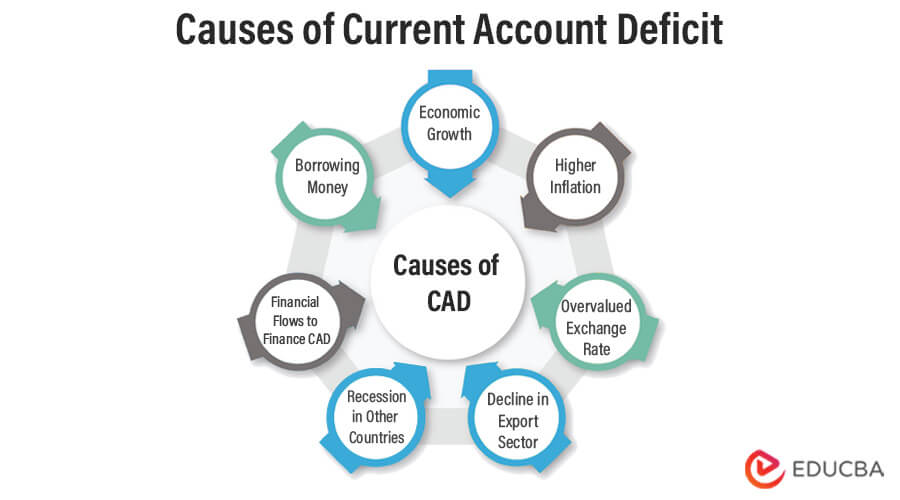Ahmedabad
(Head Office)Address : 506, 3rd EYE THREE (III), Opp. Induben Khakhrawala, Girish Cold Drink Cross Road, CG Road, Navrangpura, Ahmedabad, 380009.
Mobile : 8469231587 / 9586028957
Telephone : 079-40098991
E-mail: dics.upsc@gmail.com

Current Account Deficit
News: Recently released Government Data shows that India’s exports and imports declined by 6.59% and 3.63% respectively in January, indicating that the current account deficit (CAD) will moderate despite the global slowdown triggered by the rising inflation and interest rates.
What is CAD?
When the value of the goods and services that a country imports exceeds the value of the products it exports, it is called the current account deficit.
CAD and the fiscal deficit together make up the twin deficits – the enemies of the stock market and investors.
What are its implications?
The CAD is significant because it affects the economy, stock markets, and returns on investments by people.
While rising CAD raises concerns among investors as it hurts the currency and thereby the inflow of funds into the markets, a notable decline in CAD in January has improved market sentiments.
A surplus in the current account indicates that money is flowing into the country, which can boost foreign exchange reserves and the value of the local currency.
What are negative impact of CAD?
When a country's imports exceed its exports, it can cause a decrease in demand for its currency, leading to depreciation of currency.
Imports become more expensive which in turn contributes to higher inflation and reduces purchasing power.
If a country is unable to finance its current account deficit with foreign investment, it may need to borrow to cover the gap. This can lead to an increase in debt levels, which can further harm the economy.
How can we moderate CAD?
Firstly, we must make our exports competitive globally. When we do that automatically our exports will improve and consequently CAD will decline.
Secondly, to make exports competitive the government can provide incentives to export-oriented industries, minimize barriers that harms our exports.
Thirdly, encouraging domestic production of goods that are currently being imported can help to reduce the trade deficit. Through this, we can also realize our vision of Atmanirbhar Bharat.
Fourthly, improved service exports.
Lastly, domestic economy can be made more robust so that it can withstand shock of external environment and our fundamentals remain strong. This can be ensured through improved infrastructural facilities, regulatory reforms, ease of doing business, adoption of newer technologies and skilling of Indian employees.
Conclusion
As quoted by Nilesh Shah, MD, Kotak Mahindra MF, “The reduction in CAD, thanks to services exports, is a positive sign. However, we need to maintain this for many more months before we can say that the CAD worry is behind us”.

Address : 506, 3rd EYE THREE (III), Opp. Induben Khakhrawala, Girish Cold Drink Cross Road, CG Road, Navrangpura, Ahmedabad, 380009.
Mobile : 8469231587 / 9586028957
Telephone : 079-40098991
E-mail: dics.upsc@gmail.com
Address: A-306, The Landmark, Urjanagar-1, Opp. Spicy Street, Kudasan – Por Road, Kudasan, Gandhinagar – 382421
Mobile : 9723832444 / 9723932444
E-mail: dics.gnagar@gmail.com
Address: 2nd Floor, 9 Shivali Society, L&T Circle, opp. Ratri Bazar, Karelibaugh, Vadodara, 390018
Mobile : 9725692037 / 9725692054
E-mail: dics.vadodara@gmail.com
Address: 403, Raj Victoria, Opp. Pal Walkway, Near Galaxy Circle, Pal, Surat-394510
Mobile : 8401031583 / 8401031587
E-mail: dics.surat@gmail.com
Address: 303,305 K 158 Complex Above Magson, Sindhubhavan Road Ahmedabad-380059
Mobile : 9974751177 / 8469231587
E-mail: dicssbr@gmail.com
Address: 57/17, 2nd Floor, Old Rajinder Nagar Market, Bada Bazaar Marg, Delhi-60
Mobile : 9104830862 / 9104830865
E-mail: dics.newdelhi@gmail.com